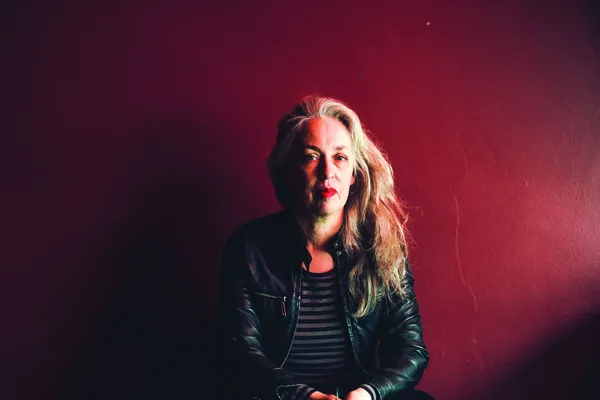 |
| Jane Giles Photo: Matt Hass |
Actors, directors, genres, national film cultures: these are the subjects that tend to dominate cinephilic bookshelves. Comparatively few books are dedicated to the places where films are actually seen. But with cinemagoing seemingly under constant threat and film buffs nostalgic for a time when cinemas were attractive rather than functional places and still the primary environment to see movies, maybe that’s changing.
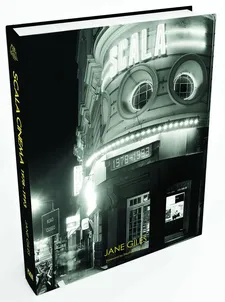 |
| Scala Cinema 1978-1993 Photo: courtesy of FAB Press |
Scala Cinema 1978-1993, a new book by Scala programmer and journalist Jane Giles, is the story of the legendary King's Cross cinema that still inspires excitement in cinemagoers, even though its doors closed two and a half decades ago. With a programme that few could rival, then or now, and fans numbering Peter Strickland and Christopher Nolan (he still carries his old membership card in his wallet), the cinema was a fantasyland of high and low film culture, the closest London got to America’s mythical grindhouses and repertory theatres with monthly programmes promising anything-goes feasts of double bills, triple bills and all-nighters. Helping launch films like Eraserhead and Pink Flamingos in the UK, the Scala was famously anti-hierarchical in its tastes, happy to show everything from the most canonical classic to the least respectable sleaze.
If this all sounds too good to be true, Scala Cinema 1978-1993 provides ample evidence to imagine (and then search out long forgotten titles). It reprints all the programmes in all their tempting, bacchanalian glory, with commentary from Giles that situates the cinema in the socio-political-cultural turning points of the time. Eye for Film got in touch with Giles to talk cinemas, cats and canons.
Sunil Chauhan: It’s a big book – why did you decide on such an imposing size?
Jane Giles: When I first thought of the book I just thought it was going to be a normal history book. I went to a few publishers but they thought it was a very niche subject matter. The only one who got it was Harvey at FAB Press and he had the idea to publish a complete collection of Scala programmes. So Harvey and I put our ideas together: a cultural history that talked about bigger issues than just a cinema and his idea which was to do with making the biggest book possible of Scala programmes. Because it was a big venue. It was huge. It is a bit of a mad book. It’s like a Victorian folly.
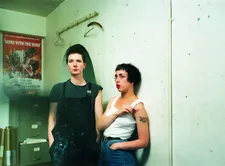 |
| Behind the scenes at the Scala Photo: Mair Payne |
SC: Were the programmes crucial to conveying the essence of the Scala?
JG: The Scala brought things together. It’s all on the face of the programme. It showed a classic film, a gay film, a horror film, without confusing audiences. The book has worked out really well as a representation of what the Scala was. This was a way to show the cinema’s evolution from the first year to the last. Its first day was almost to the day of Thatcher getting elected, and the last day, it didn’t get into the Labour years, but it was an interesting 15 years, politically, socially. You can see the moment when AIDS appears for the first time in the 1980s, just before Rock Hudson died. It was a triple bill of Douglas Sirk films for the Terrence Higgins trust. It was a massive moment.
SC: Cinemas are typified as places to escape reality, but did you want to make sure the book didn’t miss that link between the cinema and what was happening outside it?
JG: Even before the Scala, I look at cinema programmes from The Other Cinema which was a socialist collective and every week there was a benefit. There was a synchronicity of film societies, causes and politics that really united people. It was still there in the Seventies and Eighties. I think it was dying by the 1990s. It’s still there now but it’s not quite so concerted. If you look at the Prince Charles or BFI, you don’t really see thematic programming around causes. You don’t really see fundraising.
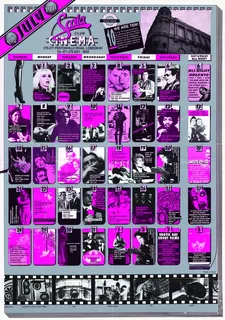 |
| A typical Scala programme Photo: courtesy of FAB Press |
SC: Was it the Scalarama festival that made you think there was an audience for a book like this?
JG: Scalarama helped motor the idea underneath the book. I was working at the BFI when they pitched me the idea, and I said ‘well you’re too young, you never went there’, but they said ‘yeah, but we just like the idea of it’. This was the thing really driving Scalarama, not so much the people who were there, trying to recreate it, but the people who were too young but liked the programming philosophy. It’s quite free and open and imaginative and allows mad programming ideas. The Scala inspired my ideas about film. Not the canonical BFI version, but another version, a flipside or alternative reality. Which I think has been knocked out of film history.
SC: How did the Scala reject the canon at the time?
JG: The BFI or the Everyman in the Seventies and Eighties, they had this idea of great film and good film: something good for your soul, like good literature. It sort of cut out anything that was sleazy, trashy or overly fun, or didn’t really work but was still interesting. Kind of based around something like Sight and Sound’s top 100 films list. Very few modern classics, films made after 1980. A very macho idea of what arthouse cinema is. That’s not to say there weren’t women involved, but the history of film criticism and publishing has been overwhelmingly male. The Scala was very inspired by calendar programmes and cinemas like the Roxy in San Francisco. The Scala nicked its ideas from those cinemas and freely admitted that it did. Something like Withnail and I which had been out but died on its feet, it went into rep in 1987, the audience came, they programmed it again, and then more and more people came. That’s how these cults were made. Same with David Lynch and John Waters. The alternative canon was invented by the Scala audience. The audience really wanted to see Pasolini, Borowczyk, the outrageous films that weren’t going to be on TV as TV had specific guidelines about what could and couldn’t be broadcast. The Scala was the only place to see certain wild things in terms of horror and sexuality.
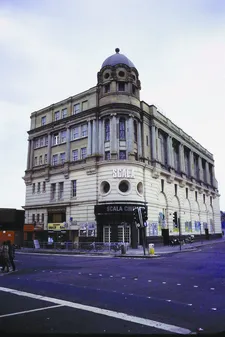 |
| The Scala in 1988 Photo: courtesy of FAB Press |
SC: Stephen Wooley – co-owner of the Scala - described how each cinema in London at the time had its own programming niche. Did the Scala attract a crowd that wouldn’t have gone to other cinemas?
JG: Real cinema lovers went everywhere. And they were the real hardcore at the centre of everything. But the Scala attracted its own audience because it was really good value. You could go to a double or triple bill or an all-nighter and it would still only cost £4. Less with a student card. We had UB40s in those days, the dole card, so it was really good value, a way to see a lot of films for not much money. It was also a way to drink after hours. In those days pubs weren’t licensed late. The latest you could drink was 11.45pm at night but at a Scala all-nighter, you could drink all night. That was part of the culture. Going out with your mates, going to an all-nighter, drinking Stella all night and having a laugh. That’s what it was. There were people devoted to those.
SC: You’re not from London but you still discovered the Scala. Was that common?
JG: People were coming from all over the country. I certainly did. I lived in west Sussex. I’m not sure to what extent people travel a long way to go to the cinema now. Maybe for the London Film Festival. But I was at school. I was at 16 and I was hanging out with a bunch of guys who were punks. They had been to the Scala in Fitzrovia. And it had just been moved to King's Cross. And we wanted to see Assault On Precinct 13 and Halloween which were part of an all-nighter. It was exciting and it was an adventure. So I subscribed to the mailing list and I just continued going. I liked the cats. It was like home from home. You had your cat at home and you had your cat at the cinema. It was a nice atmosphere. No hassle. A real mix: some old people, young people, anoraky people with plastic bags, high fashion people. You’d see Nick Cave coming out the toilets, David Hockney with light reflecting off his glasses, the Jesus and Mary Chain just sitting in the back row.
 |
| Inside the Scala projection booth Photo: courtesy of FAB Press |
SC: You programmed at the Scala between 1988 and 1992 – how did you get the job?
JG: I was 23 at the time. I thought this was normal. I thought this was how the world worked. You saw a job advertised, you applied, and you got it. I had been going there since I was 16. I loved horror, gay film, melodrama, and I loved cats, so it just clicked into place. There were quite a few women programming film at the time. It was unusual to get a job so young but Stephen Wooley was only 19 when he was running the Scala. He was 22 when he turned The Other Cinema into the Scala. And he always believed in youth and enthusiasm.
SC: Was it an intense experience?
JG: It was very, very intense. Because there was only one programmer. I didn’t know it was better to bounce ideas off another person. And I was dealing with staff management, publicity, all of this. It was a very small staff. It was where I went in the evening and where I worked in the day and my boyfriend was front of house manager. So I never got away from it. It was my life. When I left, I was burned out. It was a very difficult place to run, to work at, so I left to give someone else a go.
SC: Did the Scala feel like it was a special place at the time?
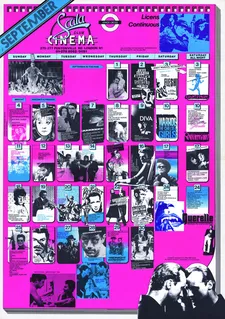 |
| More Scala treats Photo: courtesy of FAB Press |
JG: I’d say we knew it was great but we did take it for granted.
SC: Could it have stayed open?
JG: Towards the end, the cinema got very cold. The boiler was broken. We couldn't afford to fix it. We weren’t subsidised. The audience died down. King's Cross got very dilapidated.in the run up to the regeneration of the area. It was literally filthy. Crack dealing was rife. Prostitution was rife. It was a pretty horrible place. But the lease ran out. It all finished. There was a lot of effort to save it but economics beat us down into the ground. Also Stephen Wooley's company Palace Pictures went bankrupt so he was not in a position to set it up somewhere else. VHS was becoming affordable, even students had a video in their place, and it was a novelty to have a load of beers and watch five films. And this was during a recession. So things changed.
SC: Are cinemas still as important in the streaming era? Could the Scala exist today?
JG: The physicality is important. The people who are going to become creatives, writers, the impact needs to be big. That’s why it’s important to see things in a ritualistic way, on a big screen with an audience rather than on your own on a small screen in a domestic environment. The Scala was immersive. You would go into this terrific environment and just lose yourself for four hours. You’d go to watch one film but then you’d go and see another. It was what was known as a continuous programme. Now, you’d get kicked out of a cinema. But at the Scala you could go in at any time, which is how people used to watch films. In the Forties and Fifties, you’d just go in and stay until you reached the point you arrived at. Now, double bills, triple bills, people can’t seem to imagine where they would find the time to see that much film.





















